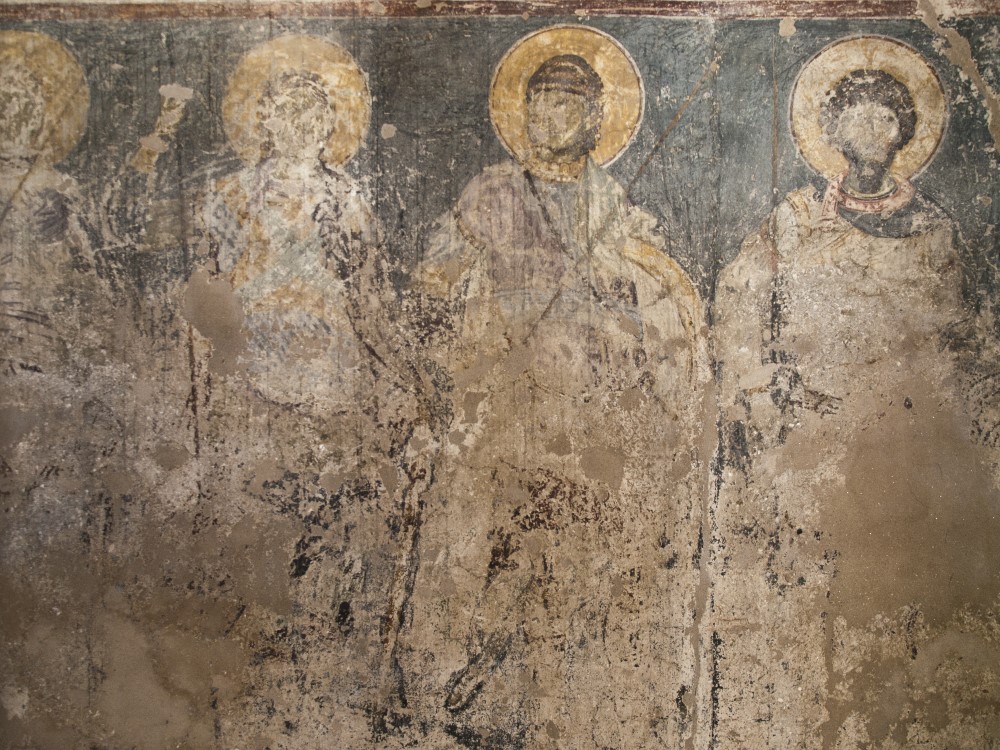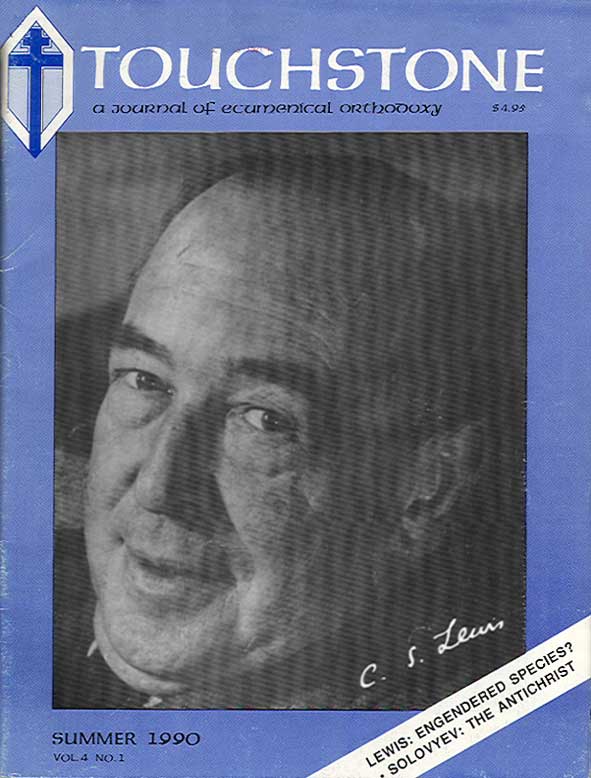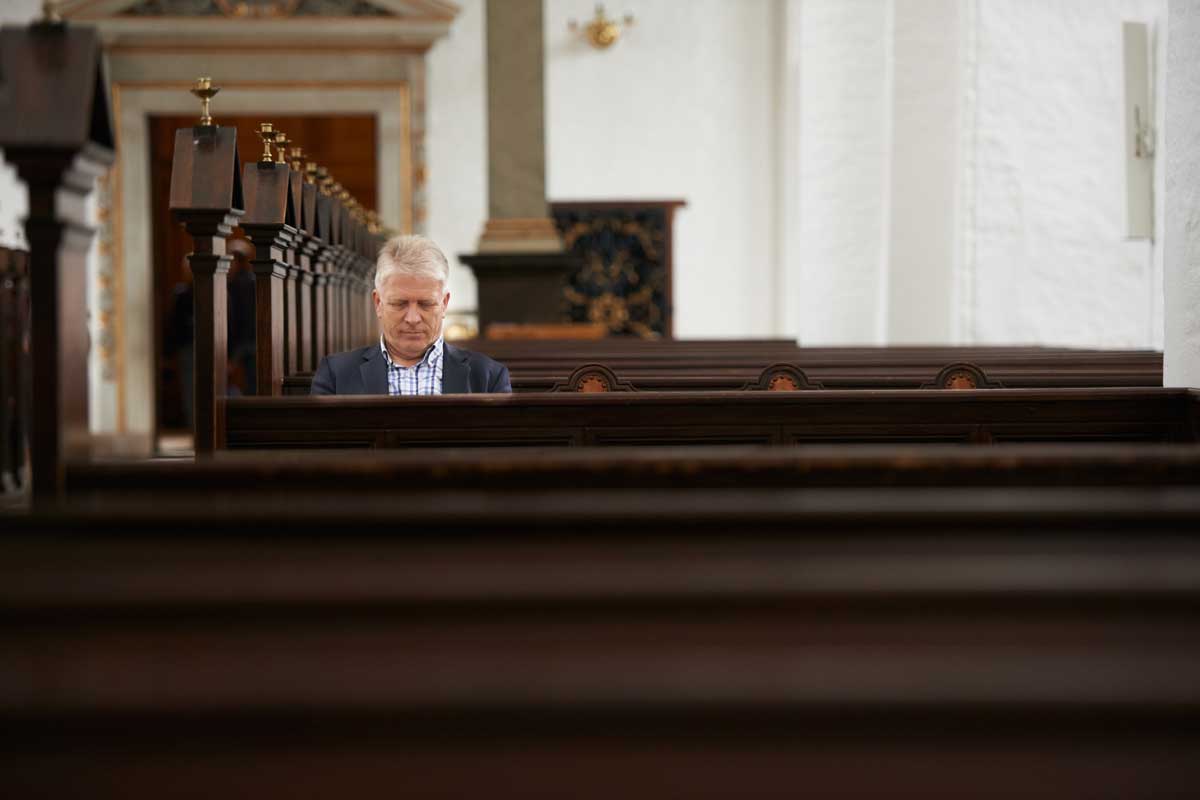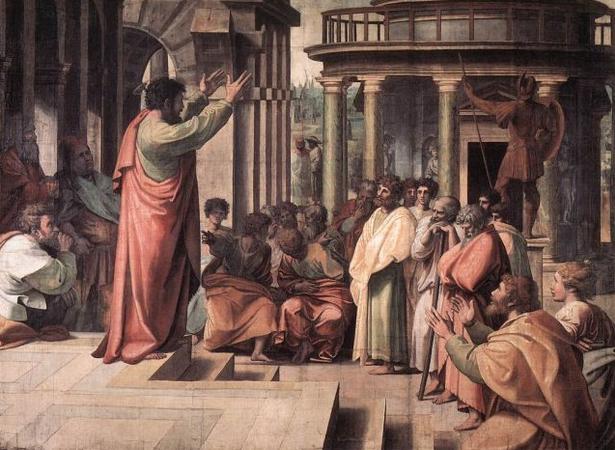Beyond Patriarchalism & Feminism
Willingness to be Least in the Kingdom
I greatly appreciated Patrick Henry Reardon’s incisive critique of the current fashion of speaking of God inclusively ("Imaging God"). His assessment of Holsinger’s position is right on target, for Christian faith is not agnosticism but “a steady and certain knowledge” of God founded on his promises in Holy Scripture (Calvin). This knowledge to be sure is not complete nor is it univocal, but it is sufficient for understanding God’s nature as both holiness and love and his will as the redemption of the world. When God revealed himself in Jesus Christ, he revealed not just a part of himself but his very self. The God incarnate in Christ is none other than God as he exists in himself (Barth).
I further agree with Reardon that the battle today is with two ancient heresies that have appeared in new guises—nominalism and gnosticism. Yet it is always well to remember that heresies could not emerge unless orthodoxy had itself become somewhat heretical. Gnosticism represents a protest against worldliness and materialism in the Church. Nominalism is a reaction to a rationalism that reduces the Christian revelation to universal truths directly accessible to human reason.
Reardon correctly points to an important area of disagreement with my position. Whereas I hold that God adopted patriarchal concepts in order to reveal his will and purpose to the human race, Reardon reads patriarchy into the very being of God; he can make the astounding statement that patriarchy belongs to “the substance of revelation.” While it is true that various church fathers, for example Origen,1 described God in largely patriarchal and monarchial terms, the developing consensus in Church tradition was that this direction of reasoning was fundamentally mistaken, for it created a bifurcation between God the Father and the other persons of the Trinity. Orthodoxy (at least in the Western church) teaches the full equality of the members of the Trinity. To teach the monarchy of the Father almost invariably ends in subordinationism. The Athanasian Creed is quite emphatic that the three persons of the Trinity are coeternal and coequal. “And in this Trinity none is before, or after another: none is greater, or less than another.” (No. 25)2 Much of the speculation regarding the Father as the origin or source of the Son and Spirit has been unwise and has kept the door open to a subordinationism that the Church has struggled against through the centuries and has never entirely overcome.3
There is, of course, a true subordinationism—in the Godhead as well as in the human family. The Son voluntarily subordinates himself to the Father in order to carry out a particular mandate, and the Spirit comes to the assistance of the Son and the Father. This is a subordination in roles or activities, not in substance or being. Even here we do not have an ironclad rule. The Bible gives examples of the subordination of the Father to the Son (John 5:22; 15:16) as well as the subordination of the Son to the Spirit (Matt. 3:16; 4:1; Mark 1:12). It also acknowledges the equality of the Son and the Spirit (Rev. 22:17) as well as the equality of the Son and the Father (John 5:18–21; Rev. 3:21; 5:13; 21:22). In its doctrine of perichoresis the church affirms that all members of the Trinity participate in the acts of the others. There is a certain priority of the Father in modes of existence within the Godhead as well as in the ways by which the Godhead relates itself to the world, but this does not mean that the Father has an ontological preeminence over the Son and the Spirit.
Likewise there is a certain priority of man over woman; yet this does not indicate a superiority in being but a call to assume a particular role—provider and protector of the family. The role to which each of us is directed, however, is not a law of creation that can never be broken, but an invitation to partnership in service and ministry. Finding one’s role in human society is shaped less by physiology and psychology than by the vicissitudes of history. The Christian must rely not on inflexible, universal principles, but on the divine commandment, which is always particular and concrete. While the Bible does offer guidelines, these remain general and abstract until the Spirit applies them to a specific life situation and we hear his command addressed personally to us.4
Man and woman, who are created for partnership with one another, are nevertheless free to work out the particulars of their own vocation as the Spirit leads them. In most cases the husband will be the breadwinner and provider, and the wife will play a supportive but nonetheless crucial role as mother and mistress of the house. But on some occasions the wife may work with her husband in direct ministry (as in the case of Priscilla and Aquila). On other occasions the woman may receive the call to fulltime church service (as in the case of Phoebe and Junia). On still others the woman may assume the position of spiritual leadership over men (as did Deborah and Huldah). This does not mean that in any of these instances the order of creation is annulled, for there will always be enduring physical as well as immutable psychic differences between man and woman. These differences, however, do not bar the woman from leadership positions in either the civil or religious society, although when called to a leadership position she should endeavor to fulfill her responsibilities as a woman, not as a man.
My contention is that though the revelation of God comes to us in the form of both patriarchy and monarchy, it actually overthrows the patriarchal and monarchial systems that dominated the cultures of the past. It introduces us to a God whose fatherhood contravenes the human experience of fatherhood, as this has been corrupted by human sin. This God is a Father who nurtures and cares for us, even to the extent of sacrificing himself for us; he does not simply dictate to us or try to control us. This God is a Master who desires to relate to us as a Friend (Ex. 33:11; Jer. 3:4; John 15:14, 15). He is a Lord who realizes his lordship in the form of a servant (Matt. 20:25–28; Mark 10:42–45; Phil. 2:7). His kingdom is entirely different from the kingdoms of this world (Matt. 26:52–53; John 18:36), for it is based not on coercion and manipulation but on the power of the powerlessness of love. This kingdom, moreover, challenges the supremacy of the patriarchal family, for discipleship invariably involves breaking with family loyalty out of commitment to the imperatives of the gospel (Matt. 8:21–22; 12:46–50; Luke 9:59–60; 14:26).5
The God of the Bible cannot be aligned with either patriarchalist or feminist ideology. Biblical teaching contradicts both subservience to earthly authority and emancipation from the strictures of tradition in order to realize personal goals. The God upheld in biblical religion cannot be reduced to either the Sky Father or the Earth Mother. He is not simply above or below but over, in, with, and around us. He is a King who overthrows all human conceptions of kingship and lordship. He is sole ruler of the world and sole Savior of humankind, but he desires to make us covenant partners with him in manifesting and demonstrating his work of reconciliation and redemption. He relates to us as Father, Son and Spirit, but he also acts in ways that sometimes permit us to describe him as mother, sister, and brother. His name is Father, Son and Spirit, but his ways with us call forth a myriad of images and metaphors that simply cannot be subsumed under either patriarchy or monarchy.
I grant with my critic that one must be exceedingly careful in addressing God in any way that would subvert the name by which he desires to meet us. In the Wisdom literature of the Old Testament and Apocrypha, Wisdom is sometimes portrayed as our mother and our sister, but we are given no mandate to invoke the divine by these metaphors.6 One might say that while the Word of God (with whom Wisdom is identified in the New Testament) has a masculine name, it also has a feminine face, or at least one of its faces is feminine. I would not encourage any Christian in his or her private devotions to call upon God as mother and sister, partly because of the current heretical milieu in which these metaphors are employed, but I would not absolutely forbid it.
We must not fall into the error of regarding God as primarily or exclusively masculine and only secondarily or accidentally feminine. Because God created both man and woman in his image, the glory of deity is reflected equally in both. Yet God chooses to relate to us in the form of the masculine—as Father, Son and Spirit—and we are called to meet him in the form of the feminine—as his bride, his wife, and his daughter. The feminine side of the sacred is precisely to be found in the Church—the bride of Christ, the daughter of Zion. The Church, moreover, is not simply a gathered fellowship of believers but the very body of Christ. It is mystically united with its Lord and Head, just as branches that participate directly in the vine (John 15:1–6). The Church represents not simply the human but the divine in and with the human.
In the language of the Bible the feminine dimension of God is hidden in the masculine, but it is nonetheless there. Gender imagery as applied to God in Scripture does not so much indicate particular qualities within God as specific movements of God.7 God going out of himself and relating to the creature is God as Father, Lord, and ruler. But God as the creative life within the Church that gives birth to and nurtures people of faith is properly envisioned in maternal terms.
In biblical perspective the masculine has functional but not spiritual priority over the feminine—in both the Godhead and the human family.8 This is to say, commanding and leading are prior to assisting and obeying. The Father leads, the Son obeys, the Spirit implements. But this must not be taken too rigidly, for on occasion the Father also obeys and follows, the Son and Spirit also command. We need today to recover the Augustinian notion of the full equality of the members of the Trinity even while acknowledging a differentiation in roles that must not be pressed too far lest we undermine the indivisible unity of the one God in his various modes of being.
The inter-Trinitarian relationship of the members of the Godhead is marked by an outgoing, self-giving love that includes the note of mutual submission.9 In God’s relationship to the world this love is conspicuous in the Son’s free subordination to the Father in carrying out the Father’s will. Through the Son’s voluntary humiliation which led to the cross, he enabled sinful humanity to be reconciled to the Father. He also showed us the way to live victoriously in the freedom of the Spirit—by taking up the cross and following him into the darkness of the world.
Only when we break with a false subordinationism will we be able to do justice to the revolutionary subordinationism affirmed by our Lord and the apostles.10 The subordination encouraged in the New Testament is a privilege and indeed the badge of being a disciple rather than a burden that carries the notion of inferiority. The alternative to both feminist ideology, which allows no place for subordination, and patriarchalist ideology, which teaches subordination as a necessity of nature, is a covenantalism of grace, which unites man and woman in a ministry of service—most often with the former leading and the latter assisting, though not as a rule or law imposed from above but as a guideline that proves to have practical efficacy in the fulfilling of a particular task. Both man and woman are given preeminence in the kingdom of God, but this preeminence is conditional on the willingness of both to be least in the kingdom (cf. Matt. 18:4; Mark 10:44; 1 Cor. 15:9; Eph. 3:8). •
Notes:
1. Origen affirmed the co-eternity of the Son with the Father, but he nevertheless referred to the Son as a mediating organ within the Godhead lower in rank than God the Father. Only the Father is without origin, for he is not even generated. Interestingly, Origen taught that prayer should be addressed to the Father alone. Orthodoxy and subordinationism also coexisted in Athanasius and most of the apologists. A form of subordinationism reappears in Emil Brunner, who maintains that the Father alone is Creator and Elector and the Son is only the mediator of creation and election.
2. Although widely used in Western Christendom, the Athanasian Creed was never a recognized standard in the Eastern churches. It has nevertheless “appeared (without the Filioque clause) in the Greek Horologium since c. 1780 and in Russian service books from the 17th century.” See Oxford Dictionary of the Christian Church, revised ed. F. L. Cross and E. A. Livingstone (NY: Oxford University Press, 1983), pp. 100–101.
3. While it is true that there is an order of procession within the Godhead with the Father being the initiator of action, this does not mean that the Father is the originator of the essence of either the Son or the Spirit. Nor does it mean that fulness of being is in the Father alone and in the Son and the Spirit only derivative being.
Claude Welch has these helpful comments; “Whether we ought properly to speak of ‘relations of origin’ depends upon what we mean by this phrase. Since we incline to say that it is properly God, the one divine being, who subsists in three modes of existence, we cannot speak of origin in the literal sense of communicatio essentiae (or of the dictum Pater est fons totius trinitatis, which has the same connotation of an origination and transmitting of essence). But we can speak of original relations in the sense that God’s mode of existence as the Father is the ground of his mode of existence as the Son, and these two are the ground of his mode of being as the Holy Spirit.” In This Name (NY: Charles Scribner’s Sons, 1952) p. 284.
4. The headship of the man in the family is a biblical rule or guideline, but how this is to be effected in a particular situation depends upon a divine command addressed to the persons in that situation. If the man is incapacitated or wanders into religious infidelity, then it may be God’s will for the woman to assume full responsibility for the spiritual nurture of the children.
5. Needless to say, the kingdom of God also contradicts the modern idea of the egalitarian family by upholding representative headship and loving submission within the family. The headship of the husband is not unconditional, however, for in the absolute sense Jesus Christ alone is head of the family.
6. While Wisdom is referred to as “sister” and “kinswoman” in Proverbs 7:4, these are not proper names for God but instead metaphors indicating a warm, intimate relationship between mortals and the divine. Those biblical passages that speak of God as mother do so indirectly, not directly. “Mother” in this context is not a predicative metaphor but a simile; that is to say, God is not designated as our mother but is depicted as being like a mother (cf. Ps. 17:8; 91:4; 131:2; Isa. 46:3–4; 49:15; 66:13; Matt. 23:37; John 3:4–7).
7. I fully agree with Patrick Reardon that while God infinitely transcends human understandings of gender, he also transcends the denial of gender. Because the God of the Bible is a personal God, gender imagery is therefore appropriate in our speech about God. But gender descriptions of the deity are never univocal but either analogical or metaphorical.
8. It could be argued that the masculine has spiritual supremacy over the feminine in the relation of God to his people, but the spiritual preeminence of God lies in his deity, not in his masculinity as such.
9. Claude Welch makes this astute observation: “The Triune God is in his own life a being-for another, an eternal and internal self-impartation which is the ground of his gracious, free-self-impartation to man.” op. cit., p. 286.
10. The term “revolutionary subordination” comes from John Howard Yoder’s The Politics of Jesus (Grand Rapids: Eerdmans, 1972) and denotes a subordination that is freely and gladly given, involving not only “subordinates” to “superiors” but also “superiors” to “subordinates.”
Donald G. Bloesch is Professor of Theology at the University of Dubuque Theological Seminary and the author of many books, including The Battle for the Trinity: The Debate over Inclusive-God Language (Ann Arbor: Servant, 1985).
Donald G. Bloesch is Professor of Theology Emeritus at Dubuque Theological Seminary. He has written numerous books, including The Future of Evangelical Christianity, The Struggle for Prayer, Freedom for Obedience, and is currently working on a seven-volume systematic theology, Christian Foundations. He lives in Dubuque, Iowa, with his wife, Brenda.
subscription options
Order
Print/Online Subscription

Get six issues (one year) of Touchstone PLUS full online access including pdf downloads for only $39.95. That's only $3.34 per month!
Order
Online Only
Subscription

Get a one-year full-access subscription to the Touchstone online archives for only $19.95. That's only $1.66 per month!
bulk subscriptions
Order Touchstone subscriptions in bulk and save $10 per sub! Each subscription includes 6 issues of Touchstone plus full online access to touchstonemag.com—including archives, videos, and pdf downloads of recent issues for only $29.95 each! Great for churches or study groups.
Transactions will be processed on a secure server.
more on fatherhood from the online archives
more from the online archives
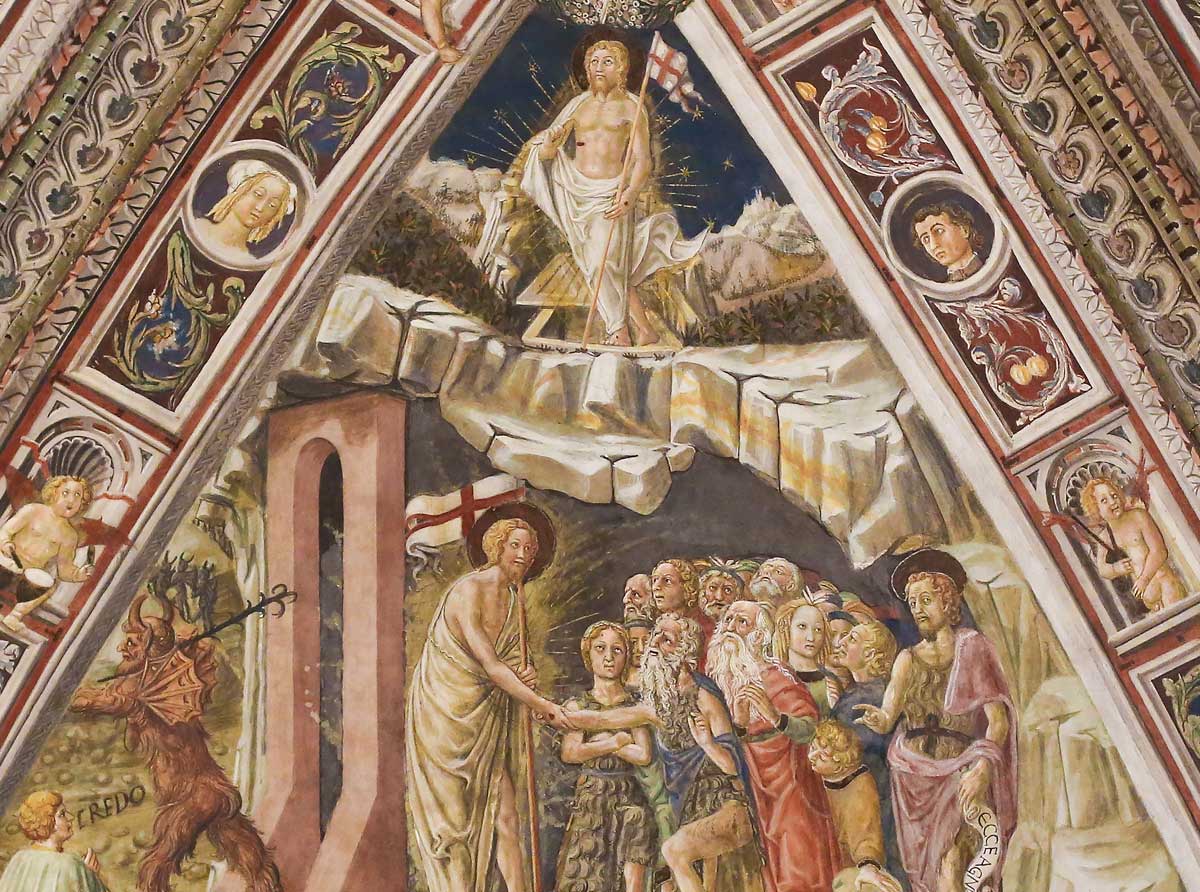
14.6—July/August 2001
The Transformed Relics of the Fall
on the Fulfillment of History in Christ by Patrick Henry Reardon
calling all readers
Please Donate
"There are magazines worth reading but few worth saving . . . Touchstone is just such a magazine."
—Alice von Hildebrand
"Here we do not concede one square millimeter of territory to falsehood, folly, contemporary sentimentality, or fashion. We speak the truth, and let God be our judge. . . . Touchstone is the one committedly Christian conservative journal."
—Anthony Esolen, Touchstone senior editor





